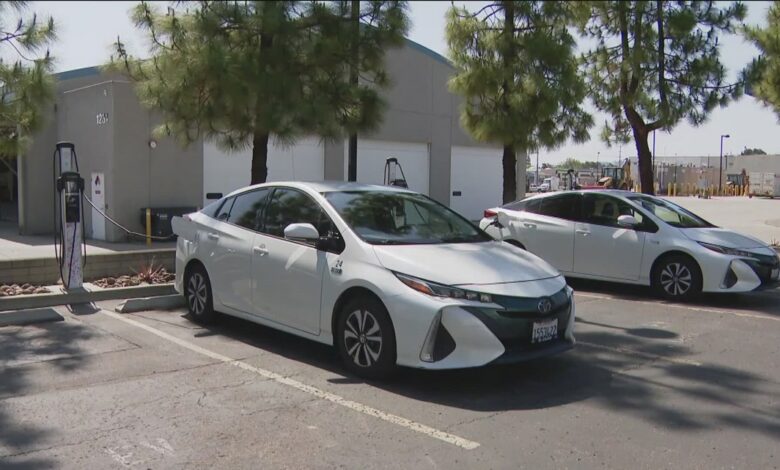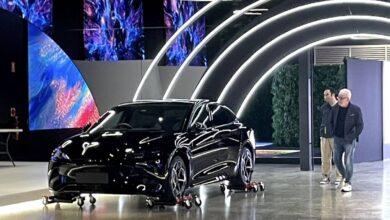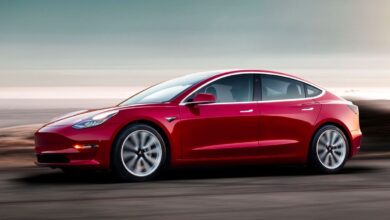California electric vehicle regulation prompts funding questions

The Helix Water District will eventually need to transition all of its diesel fuel work cars to electric vehicles.
SAN DIEGO — A California regulation that requires government agencies to transition diesel fuel work cars to electric vehicles is prompting questions on how to access funding for the new vehicles.
Helix Water District in East San Diego County is one government agency that has had to figure out how to pay for all electric cars to comply with the new state requirements.
“It’s not something that you can get the regulations one night and build a project the next day. These things take time,” said Kevin Miller, director of operations for Helix Water District.
The Helix Water District helps provide water to residents in East County. The majority of their customers are low income.
Miller said at one point, one of the biggest concerns was whether their rates would increase because of the transition to electric vehicles.
The company has 120 vehicles, most of them pick-up trucks and heavy duty trucks.
Not only will all of the vehicles eventually need to be replaced, but the company will also need to build the proper infrastructure to maintain an electric fleet.
Advanced Clean Fleets regulation details
The California Air Resources Board approved the Advanced Clean Fleets regulation in April 2023. As of Jan. 1, 2024, it requires some fleets to make 50% of their annual vehicle purchases zero-emissions. By Jan. 1, 2027, the regulation requires 100% of vehicle purchases at local and state government agencies to be zero emissions.
“While trucks represent only 6% of the vehicles on California’s roads, they account for over 35% of the state’s transportation generated nitrogen oxide emissions and a quarter of the state’s on-road greenhouse gas emissions, making them a key sector to meeting the state’s clean air and public health goals,” said Kate Lamb, Information Officer at the California Air Resources Board, in a statement.
“While deployment for zero-emissions options starts in 2024, the regulation has a few provisions and flexibilities that were developed as part of the feedback received during an extensive public process, including two pathways to meeting the requirements and an ability to continue using existing internal combustion engine vehicles through their useful life,” Lamb said in the statement.
Here is more information from the state’s air resources board on the Advanced Clean Fleets regulation:
- “The Advanced Clean Fleets (ACF) regulation includes a phased-in shift to zero-emissions fleets for State or local government agency fleets called the ZEV Purchase Schedule.
- Beginning January 1, 2024, certain fleets must ensure that 50 percent of their annual vehicle purchases per calendar year are zero-emissions.
- Beginning January 1, 2027, that 100 percent of vehicle purchases are zero-emissions.
- Instead of the ZEV Purchase Schedule, State and local governments may alternatively choose to permanently use the ZEV Milestones Option if they prefer the flexibility of phasing-in ZEVs based on suitability of different vehicles in their fleets. In the ZEV Milestones Option fleets may elect to meet ZEV targets as a percentage of the total fleet starting with vehicle types that are most suitable for zero-emissions.
- Under both of these options, fleets can continue to use their existing fleets though the useful life of the vehicle and are not mandated to discontinue the use of these vehicles in 2027.
- When a fleet owner cannot comply due to circumstances that are beyond their control, the regulation includes a variety of provisions such as ZEV availability, vehicles operated for less than 1,000 miles per year, delays in infrastructure, vehicles involved in accidents, vehicles under mutual aid agreements, and ZEVs not meeting daily usage needs. More information on these exemptions are available at: Advanced Clean Fleets Regulation Exemptions and Extensions Overview | California Air Resources Board
- All of CARB’s regulations are developed in a public process with stakeholder engagement which continues during implementation of the regulations. As part of the initial implementation of ACF, CARB is hosting the Truck Regulation Implementation Group (TRIG). The TRIG is divided into four subgroups (Border, Infrastructure, Rule Provisions, and Outreach) and is meant to facilitate constructive dialogue to address regulation implementation challenges and to develop recommendations and action items on key issues.
- CARB has a long track record of encouraging the early adoption of the cleanest technology available. To that end, incentive and grant programs to encourage early adoption have been a part of CARB’s programs for over 20 years.
- There may be various sources of funding available to aid in the move to ZEV vehicles depending on vehicle weight and specific circumstances. Currently, CARB has a Cal Fleet Advisor program which is a no-cost service that provides guidance to fleets, independent owner-operators and school buses to navigate the move to ZEVs.
- ACF is expected to result in $26.5 billion in statewide health benefits from improved air quality and save fleet owners an estimated $48.0 billion through 2050.”
WATCH RELATED: Electric vehicle tax incentives changing in 2024 (Nov. 20, 2023)



